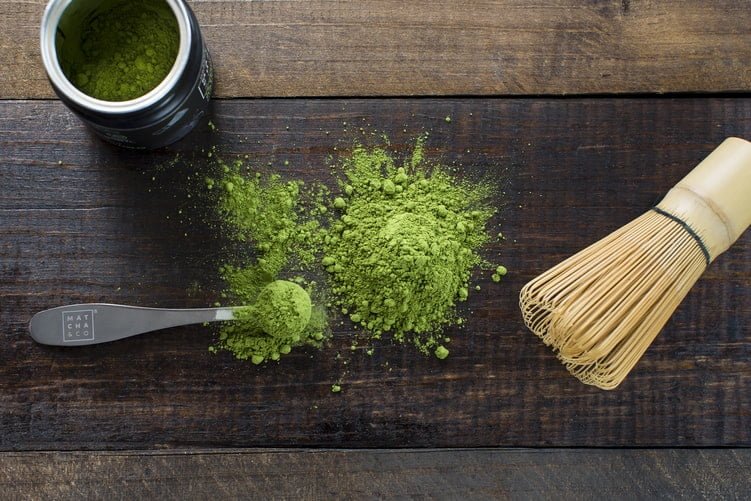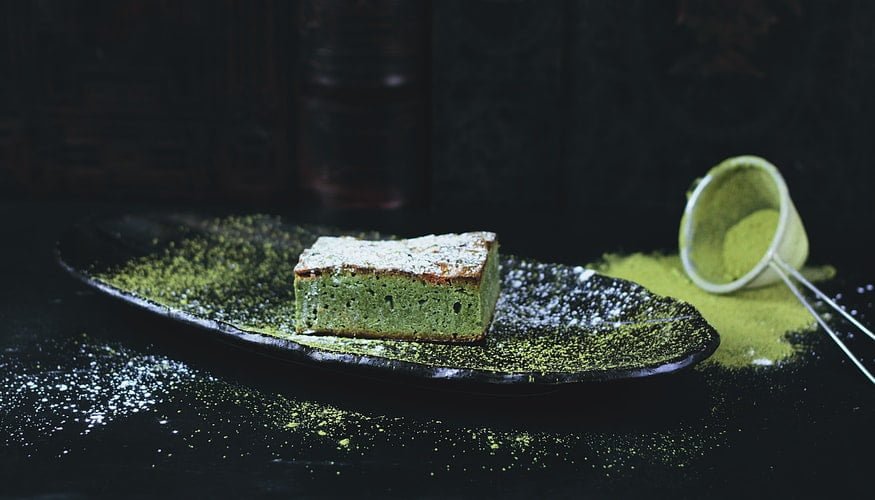I’ve been asked a lot about matcha lately; this trendy green tea is winning over even coffee lovers. Learn more about matcha and its health benefits.
Matcha is a type of green tea.
Matcha is “powdered tea.” When you order traditional green tea, the leaves are infused with hot water and then discarded. Matcha is made by mixing a teaspoon of matcha powder with a third cup of hot water (just below boiling) and whisking it with a bamboo brush until it froths.
Unlike traditional green tea, matcha is made by shading the tea plants before harvesting. This promotes the growth of flavorful leaves. Selective hand-steaming stops fermentation, then drying and aging in cold storage deepens the flavor. They are stone-ground into a powder.

Matcha is good for you.
Because matcha is made from high-quality tea and consumed whole, it contains more nutrients than steeped green tea. Matcha is high in polyphenols (Matcha Facts), which have been linked to heart health, cancer prevention, better blood sugar regulation, lower blood pressure, and anti-aging. Matcha’s EGCG polyphenol has been shown to boost metabolism and slow or stop cancer cell growth in studies.
It has caffeine.
Matcha contains three times the caffeine of a cup of steeped tea, or about the same as a cup of brewed coffee. Unlike coffee’s caffeine buzz, matcha’s natural substance l-theanine induces relaxation without drowsiness, according to devotees. To get a good night’s sleep, I believe it’s best to avoid all caffeine (including matcha) six hours before bedtime.
It usually involves meditating.
Matcha is the main ingredient in Japanese tea ceremonies and has long been associated with Zen. This is probably why it’s gaining popularity as meditation becomes more mainstream. The research on the health and weight loss benefits of mindfulness meditation is so compelling that I included a chapter on it in my book Slim Down Now and a five-minute guided meditation video on my website.
I believe the benefits of drinking and preparing matcha go far beyond the antioxidants it contains—meditation in any form has many benefits. Cortisol (a stress hormone that increases appetite and belly fat), inflammation (a known trigger of premature aging and disease), impulsive eating, blood pressure, and self-esteem are all improved by mindfulness.
The powders vary in quality and sweetness.
Matcha has a strong flavor. It tastes like grass or spinach and has an umami flavor. So it can be sweetened to make it more appealing. One client told me he was drinking matcha, but not matcha powder, but a powdered mix. It was basically hot chocolate with matcha instead of cocoa, which I wouldn’t recommend. Experts warn that quality matters with matcha, and it isn’t cheap. That is, high-quality matcha is costly. A low price may indicate a low-quality product. I like Jade Leaf Organic Japanese Matcha Green Tea Powder ($19; amazon.com) because it’s organic, Japanese, and third-party tested.
Lead contamination is a risk.
Even organic green teas, especially tea grown in China, contain lead absorbed by the plant from the environment. Green tea leaves retain about 90% of their lead content when steeped, so they are discarded. Because matcha is consumed whole, it contains more lead. According to ConsumerLab.com, which tested teas, a cup of matcha may contain up to 30 times the lead of a cup of green tea. So limit your daily intake to one cup and don’t give it to kids.

Matcha can be used in cooking.
Another Matcha Facts, Chefs are using matcha in both sweet and savory dishes. Matcha recipes include everything from muffins, brownies, and puddings to soups, stir-fries, and even guacamole! I love experimenting with it, and I previously wrote about umami foods’ potential weight loss benefits.
But, due to lead concerns, I advise against “matcha madness.” Even with superfoods, too much can be bad. Don’t overdo it on the matcha.

